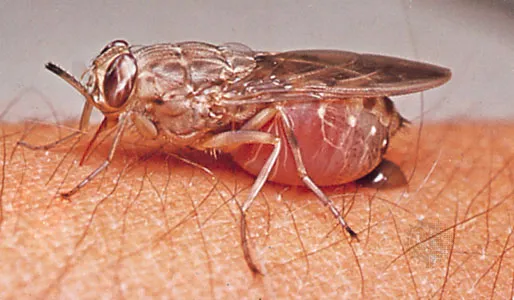
The tsetse fly bites humans and sucks their blood. This causes sleeping sickness, a parasitic disease accompanied by fever, headache, and joint pain. It also causes trouble sleeping. It is said that thousands die in Africa every year from the disease.
In the tropical regions of Africa, the bloodsucking tsetse fly carries deadly diseases to humans and other animals. It is a brownish-colored insect, only a little larger than the common housefly. When it is at rest its wings close flat on the back and are completely overlapping, whereas those of the housefly are held somewhat erect and spread. There are 21 known species of the tsetse fly. Some carry the disease trypanosomiasis (African sleeping sickness) from one human victim to another. Others carry the disease nagana to cattle and other animals.
When the fly bites an infected victim, the insect draws into its own bloodstream a parasite called a trypanosome. After going through a stage of development in the fly, the parasite is transferred to the next victim. Thus the disease, caused by the parasite, is passed from person to person, from animal to animal, through the bite of the fly. The disease is so called because in the last stages of the illness the victim falls into a sleep, which often ends in death.
The tsetse fly breeds in brushy places in tropical forests and on the edges of rivers and lakes. The female, unlike most insects, does not lay eggs. Instead, she deposits on the ground a single full-grown larva at intervals of about two weeks. The larva hides in brush and immediately goes into the pupal stage, from which it emerges as a mature fly.
Tsetse flies belong to the genus Glossina of the family Glossinidae, which is related to the Muscidae. The scientific name of the commonest carrier of African sleeping sickness is G. palpalis. The principal carrier of nagana is G. morsitans.
Trypanosomiasis is generally not found in the United States except in people who have traveled to Africa. Early symptoms include headache, fever, and muscle aches. Later, you may experience mental confusion or coma. Trypanosomiasis causes swelling in the brain and is fatal, if untreated. If you’ve been bitten by a tsetse fly, your doctor can run simple blood tests for sleeping sickness. Antitrypanosomal medications, such as pentamidine, are highly effective in treating sleeping sickness.
Picture Credit : Google



